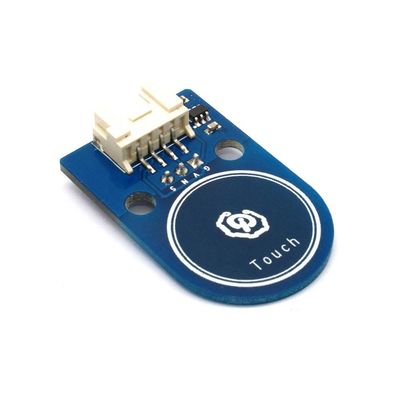Difference between revisions of "Touch Sensor/Button Brick"
(→Specifications) |
(→Electrical Characteristics) |
||
| Line 26: | Line 26: | ||
==Electrical Characteristics== | ==Electrical Characteristics== | ||
| + | {| class="wikitable" | ||
| + | |- | ||
| + | | align="center" style="background:#f0f0f0;"|'''Electrical characteristics''' | ||
| + | | align="center" style="background:#f0f0f0;"|'''Min.''' | ||
| + | | align="center" style="background:#f0f0f0;"|'''Typical''' | ||
| + | | align="center" style="background:#f0f0f0;"|'''Max.''' | ||
| + | | align="center" style="background:#f0f0f0;"|'''Unit''' | ||
| + | |- | ||
| + | | Supply voltage||2||3||5.5||VDC | ||
| + | |- | ||
| + | | Working current(VCC=5V)||-||18||-||uA | ||
| + | |- | ||
| + | | Digital output voltage(VCC=5V)||0||-||5||V | ||
| + | |} | ||
==Hardware== | ==Hardware== | ||
Revision as of 07:01, 27 May 2014
Contents
Overview
Electronic brick of touch button switch is finger-sized, which can be connected to I/O port of main board or externally disconnected to check the switch state so as to control ON/OFF of LED lamp.
Features
1. Plug and play, easy to use. Compatible with the mainstream 2.54 interfaces and 4-Pin Grove interfaces in the market.

2. With use of M4 standard fixed holes, compatible with M4-standard kits such as Lego and Makeblock.

Specifications
| PCBsize | 38.0mmX24.0mmX1.6mm |
| Workingvoltage | 3.3or5VDC |
| Operatingvoltage | 3.3or5VDC |
| Compatibleinterfaces | 2.543-pininterfaceand4-pinGroveinterface (1) |
Note 1: S for digital output port, N for not used pin, V and G for voltage at the common collector and ground respectively. When there is no operation, digital output is VDD; when the button is pressed down, the digital output is 0V.
Electrical Characteristics
| Electrical characteristics | Min. | Typical | Max. | Unit |
| Supply voltage | 2 | 3 | 5.5 | VDC |
| Working current(VCC=5V) | - | 18 | - | uA |
| Digital output voltage(VCC=5V) | 0 | - | 5 | V |
 Notice
Notice